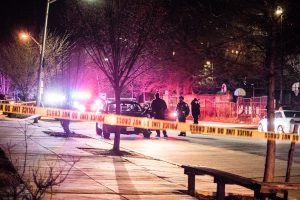This article, written by Rabbi Benjamin Resnick, is part of a weekly JTA series on Jewish-themed films and TV shows recommended for streaming during quarantining. “Liberty Heights” is free on YouTube and available to rent on iTunes, Google Play and more.
When you look up “Best Jewish-Themed Movies,” Baltimore native Barry Levinson’s 1999 film “Liberty Heights” doesn’t usually make the cut.
I’m here to correct the record.
Set in 1954 Forest Park (and featuring such Charm City landmarks as the Peabody Library and Shaarei Tfiloh Synagogue), “Liberty Heights” was the fourth and final installment of the Academy Award-winning Levinson’s celebrated “Baltimore Films,” beginning with 1982’s “Diner” and including “Tin Men” (1987) and “Avalon” (1990).
As a tetralogy tied together by mood, setting and sensibility — rather than recurring characters — the movies offer a series of semi-autobiographical accounts of Levinson’s early life in Northwest Baltimore. All of them include Jewish themes, but the R-rated “Liberty Heights” is the most forthrightly Jewish of the bunch, adopting as its central topic core questions of Jewish identity and belonging in the context of a rapidly changing American landscape.
The movie features a large and beautifully cast ensemble, including Joe Mantegna as charismatic and likable paterfamilias Nate Kurtzman. But the central plot lines — which unfold between Rosh Hashanah 1954 and Rosh Hashanah 1955 — concern the stormy voyages of cultural and sexual discovery undertaken by two brothers, Ben (Ben Foster), a high school senior, and Van (a young and dashing Adrien Brody), a college student.

Like many Hollywood explorations of Jewish identity — including the enjoyable “Keeping the Faith” directed by Columbia native Edward Norton— the central tension in “Liberty Heights” turns around the allure of the Other. In this case, that involves Ben’s tender relationship with Sylvia, the new African-American girl at school (Sylvia Johnson), and Van’s more troubled infatuation with Dubbie (Carolyn Murphy), a beautiful non-Jewish blonde who’s the girlfriend of a friend.
In addition to the beautifully seductive mood and an effortlessly engaging storyline (not to mention more than a few genuine laughs), two aspects of Liberty Heights are particularly great.
First, there is Levinson’s obvious affection for his characters and subsequently for their Judaism. Though the subject matter — mid-20th century suburban Jewish life — is similar to that of a movie like the Coen Brothers’ “A Serious Man,” “Liberty Heights” contains no trace of that movie’s sneering derision.
In exploring the foibles and contradictions inherent to American Judaism in the 1950s, “Liberty Heights” doesn’t aim to skewer anything.
Instead, it offers a lovingly realistic portrait of Jews (and blacks and WASPs) in various stages of love and turmoil. These are all basically decent people, even as their own prejudices and blind spots lead to painful interactions between them.
Second, it treats the ever-present allure of “marrying out” or “passing” neither as a litmus test of tolerance (a la “Keeping the Faith”) nor as anathema. Rather, it presents these encounters in all of their nuance, both as opportunities for genuine growth and understanding and also, inevitably, as dangerous and, for both brothers and for their father, intermittently violent adventures.
These themes, particularly as they relate to the Jewish and black communities in the United States, have a long and rich history in American literature and cinema. From “The Jazz Singer” to the finale of “Independence Day” (in which Will Smith tells Jeff Goldblum before saving the planet, “You and I are going to have to work on our communication!”), the meeting of Jews and blacks has often been portrayed both as fraught with cultural (and sometimes sexual) tension — but also as an opportunity for racial healing and a kind of salvation.
Thus, Norman Mailer’s famous contention that the Jew is the “White Negro,” who by virtue of outsider status can inhabit both identities at once, unmaking harmful binaries.
“Liberty Heights” enters into this well-heeled conversation about interracial relationships and romance with uncommon depth and sensitivity, without, mercifully, making much of an argument beyond “we’ve all got problems in the end.”
Though not exactly neutral on the question of whether Jews share more of an affinity with White America or Black America — Ben’s relationship with Sylvia is much more authentic and mutually fulfilling than Van’s relationship with Dubbie — in the end there are more than enough moments of grace to go around.

shown here with actress Michelle Pfeiffer
If “Liberty Heights” is staking a claim beyond telling a great story, it’s probably encapsulated in a brief conversation between Ben and Sylvia in which he asks her why she wants to attend Spelman, a historically black college in Atlanta, when, because of mandated desegregation, she could now go anywhere.
Sylvia, who unlike Ben comes from a wealthy family, and who is generally more comfortable in her own skin, explains that it’s a tradition in her family going back several generations.
Her message seems to be that the world is indeed changing. It is a positive social development that African-Americans can attend school anywhere, just as it’s a positive social development that people like her and Ben can meet and fall in love.
But, she says, “Just because we can [go anywhere] doesn’t mean we have to.”
I would strongly recommend giving “Liberty Heights” another look.
Rabbi Benjamin Resnick is the rabbi at the Solomon Schechter School of Metropolitan Chicago.





